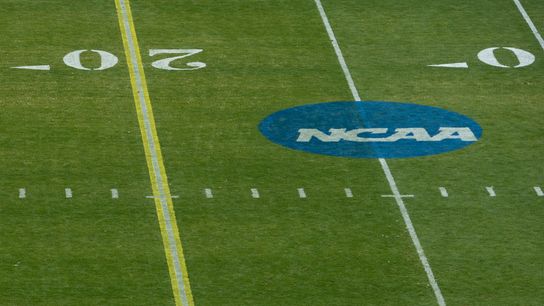In reaction to pay-for-play movements across the country, the NCAA announced Tuesday it is no longer swimming upstream. The NCAA's Board of Governors, the top legislative body inside the organization, "unanimously" voted to allow college athletes to benefit from their name, image and likeness. From the announcement:
In the Association’s continuing efforts to support college athletes, the NCAA’s top governing board voted unanimously to permit students participating in athletics the opportunity to benefit from the use of their name, image and likeness in a manner consistent with the collegiate model.
“As a national governing body, the NCAA is uniquely positioned to modify its rules to ensure fairness and a level playing field for student-athletes,” NCAA President Mark Emmert said. “The board’s action today creates a path to enhance opportunities for student-athletes while ensuring they compete against students and not professionals.”
Tuesday's announcement was intentionally broad, boiling down to a list of bullet points stating the NCAA's "principles and guidelines." All of these are intentionally vague, with the most impactful in bold.
- Assure student-athletes are treated similarly to non-athlete students unless a compelling reason exists to differentiate.
- Maintain the priorities of education and the collegiate experience to provide opportunities for student-athlete success.
- Ensure rules are transparent, focused and enforceable and facilitate fair and balanced competition.
- Make clear the distinction between collegiate and professional opportunities.
- Make clear that compensation for athletics performance or participation is impermissible.
- Reaffirm that student-athletes are students first and not employees of the university.
- Enhance principles of diversity, inclusion and gender equity.
- Protect the recruiting environment and prohibit inducements to select, remain at, or transfer to a specific institution.
The key phrase from all of this is the final sentence from the first paragraph: "in a manner consistent with the collegiate model."
My read on that is players will not be allowed to take a salary from their school simply for playing football, but that's just one man's read. As always, the devil lives in the details. For instance: what if the NCAA approves college athletes taking NIL payments in Situation X and Situation X only, but California, or Florida, or (insert state here) passes a law allowing its athletes to take payments in Situations X, Y and Z? What then? Thanks to years and years of NCAA inaction, the colleges are no longer in control of this process, lawmakers are.
It's impossible to know until the NCAA reveals how far it's willing to go, but even the NCAA isn't willing to reveal that yet.
“We must embrace change to provide the best possible experience for college athletes,” Ohio State president and NCAA Board of Governors chairman Michael Drake said. “Additional flexibility in this area can and must continue to support college sports as a part of higher education. This modernization for the future is a natural extension of the numerous steps NCAA members have taken in recent years to improve support for student-athletes, including full cost of attendance and guaranteed scholarships.”
The NCAA's Board of Governors reached Tuesday's unanimous decision by gathering input from former and current college athletes, coaches, administrators and other stakeholders across NCAA membership. It will continue to take feedback through April on how to respond to the various laws snaking their way through state legislatures across the country, and asked leaders of its three respective divisions to begin developing any new rules immediately, with a deadline set for January 2021.
As always, stay tuned to The Scoop for the latest.
